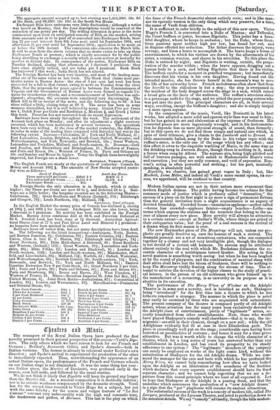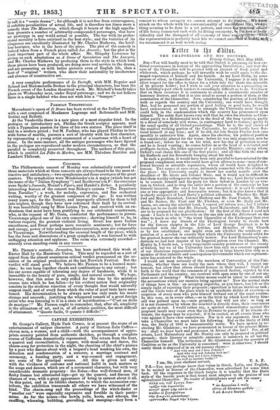Modern Italian operas are not in their nature more evanescent
than- modern English dramas. The public having become too urbane for that summary mode of justice which is profanely called " damnation " the success of a piece on its first night is no more a sign of permanent fortune than the general invitation from a alight acquaintance is an augury of devoted friendship. Crowded house—unanimous applause—author called —house less crowded—applause fainter—empty benches—Lethe—are terms which express the stations and the terminus that belong to the ca- reer of almost every new piece. Mere novelty will always be attractive to a certain extent—except at Sadler's Wells, where things are prized at their antiquarian value ; but the proof of a real success is the revival of a drama when its first season is over.
The new Haymarket piece of The Mousetrap will not, unless our pro- phetic eye greatly deceives us earn the honour of such a revival. The dramatis personte are a set of monstrous caricatures, who are connected together by a clumsy and not very intelligible plot, though the dialogue is not devoid of a certain odd humour. Its success may be attributed almost entirely to the zeal with which Mr. Buckstone delineates the ec- centric character of a midshipman turned Quaker. His acting in this novel position is something worth seeing : but when he has been laughed at by the round of playgoers, and the combination of nautical slang with drab attire shall have lost the bloom of freshness, there will be nothing to keep The Mousetrap visibly floating along the stream of time. The at- tempt to satirize the devotion of the higher classes to the study of practi- cal science, in the person of an old nobleman who gives himself up to the manufacture of a mousetrap, is as unworthy in its purpose as it is abortive in its execution.
The performance of The Merry Wives of Windsor at the Adelphi Theatre is in some sort a novelty, and is heralded as such ; Shakspere being "introduced" for the first time into a theatre to which he has hitherto remained a stranger. The manner in which the piece is acted may easily be surmised by those who are acquainted with antecedents. The present company of the theatre is composed partly of old Adelphi actors, whose attention has for many years been exclusively devoted to the Adelphi class of entertainment, partly of "legitimate" actors, re- cently transferred from other establishments. Now, those who would have played Shakspere's comedy well elsewhere—that is to say, the im- migrants—are still in their element, though on a new soil ; while the old. Adelphians evidently feel ill at ease in their Elizabethan garb. The piece is exceedingly well put on the stage; considerable care having been bestowed on peculiarities of costume ; and hence it may for a time prove attractive. But was it worth while to change the whole character of a. theatre, which for a long series of years has answered better than any establishment in London, and has owed its prosperity to its steady adherence to one system ? The "legitimate" members of the company can surely he employed on works of the light comic kind, without the substitution of Shakspere for the old Adelphi drama. While we com- mend the manager for the care and taste with which he has produced the Merry Wires, we cannot help remembering how often we have looked upon the Adelphi as an illustration of the soundness of the doctrine which declares that every separate establishment should have its fixed separate character; and we cannot help regretting that we see a de- parture from this sound principle where we least of all expected it. Let us hope that Shakspere at the Adelphi is a passing freak, and that the underline which announces the production of a "new Adelphi drama" is a sign that the "pet" playhouse will resume its ancient attractions. The substantial success of the week is a comedy of modern life, called The Lawyers, produced at the Lyceum Theatre and acted to perfection down to the minutest details. We say "comedy" advisedly, though the bills modest- ly call it a "comic drama"; for although it is not free from extravagance, it exhibits peculiarities of actual life, and is therefore ten times more a comedy than The Mousetrap, which though it boasts of the high appella- tion presents a number of arbitrarily-compounded personages, that have no prototype in any world actual or possible. The bar with its profes- sional morality is here satirized in the beat style; and the varieties of its eloquence are excellently illustrated by Mr. Charles Mathews, the brief- less barrister, who is the hero of the piece. The plot of the comedy is indeed taken from a French piece called Les Avocets ; but the plot is the least important part of the whole affair. Mr. Slingsby Lawrence by giving us such adaptations as A Game of Speculation and The Lawyers, and Mr. Charles Mathews by producing them in the style in which both these pieces have been produced, are doing more real service to the drama, and are presenting us with better pictures even of English life, than a host of "original" writers, who show their nationality by incoherence and absence of constructive art.



























 Previous page
Previous page